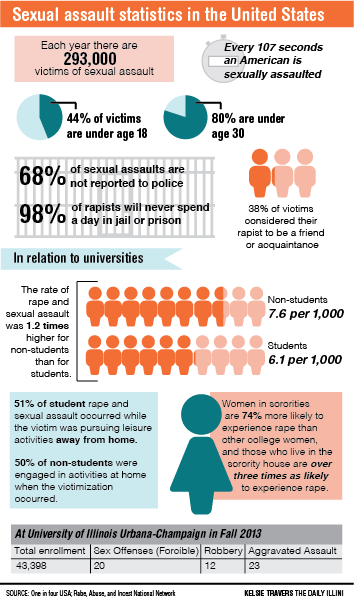Student story sparks new sexual assault policies
May 11, 2015
Lincy Pompilus, junior in LAS, was sexually assaulted by a resident adviser in a dorm over a year and a half ago — and not a day that goes by that she doesn’t think about it.
Since the attack, anxiety cripples her every move. She questions her safety during daily activities, from walking to class to hanging out with friends. She constantly dances with the threat of potentially running into her alleged perpetrator, who is still present on campus.
“There’s not a day that I don’t make a decision that is not informed by (the perpetrator’s) presence,” Pompilus said. “It’s the driving force behind the things that I do on a daily basis.”
Fed up with what she described as faults within the University’s disciplinary system, Pompilus wrote an open letter about her sexual assault to Chancellor Phyllis Wise on April 21.
Within hours of posting the letter on Facebook, which gained more than 200 shares, Wise emailed her to set up a meeting. Pompilus said they met Monday, and Wise discussed potential new sexual assault policies.
Get The Daily Illini in your inbox!
The Urbana-Champaign Senate Committee on Student Discipline created a new, separate section under the Student Code of Conduct titled “sexual misconduct” that will go into effect this fall. This section will detail specific procedures that must be followed when dealing with a student’s disciplinary case for sexual misconduct, said Justin Brown, interim associate dean of students and interim director for the Office for Student Conflict Resolution.
While the code varies case-by-case, a perpetrator can currently petition for reinstatement into the University after a sanctioned period of time, along with meeting other requirements, such as community service time or completing an educational course.
Under the new policy, Brown said the victim will now “have a right to participate in the petitioning process” when the perpetrator seeks reinstatement.
Currently, the Senate Committee on Student Discipline does not have the power to expel a student.
“Even if we don’t believe a student would ever be able to successfully petition back to the University, we still have to put some time frame into it — that’s just the nature of the sanction,” Brown said.
In Pompilus’ letter, she explained her experience, and the faults within the current disciplinary system, which allowed her perpetrator to petition to return to the University while she was still attending.
The perpetrator petitioned a semester after being found guilty of violating the Student Code, according to an email from the former director of the Office for Student Conflict Resolutions, which was obtained by The Daily Illini from Pompilus.
Under the rules of conduct within the Student Code, the committee decided the alleged perpetrator violated Student Code/1-302.b.1 and Student Code/1-302.b.2.
The sections deem that “any form of sexual penetration without consent” and “any intentional or knowing touching or fondling by either person, directly or through clothing, of the sex organs, buttocks or breasts of either person for the purpose of sexual gratification or arousal of either person without consent,” are prohibited behaviors and violate the code.
The perpetrator’s petition was successful and they returned to the University this spring.
It didn’t take long for Pompilus to realize “justice” wasn’t possible for her individual case through the University.
Pompilus is still advocating for more changes to the current disciplinary policy regarding sexual assault by working with members of the Illinois Student Senate.
Matt Hill, vice president-external for the Illinois Student Senate, and Pompilus have started the discussion on campus and are proposing that if an individual performs any sexual misconduct, he or she should not be allowed to initiate the petition process until after the survivor has graduated.
The student senate has spearheaded the University effort of the national “It’s On Us” campaign to create awareness of sexual assault.
“One of the things we have been preaching with ‘It’s On Us,’ is creating a supportive and safe environment for survivors,” Hill said. “Having to confront your perpetrator on campus is not a supportive nor a safe environment that we want any student to be in.”
Currently, if a student violates sexual misconduct statutes of the Student Code, a disciplinary officer is assigned to their case and a thorough investigation is conducted, Brown said. If the case is deemed serious enough for a hearing, a committee will be presented with the evidence surrounding the case. After a decision is reached, the parties involved have the opportunity to appeal the decision.
But while the proposal has gained a great deal of traction with the student body, enforcing it could be difficult because of the case-by-case basis that determines the outcome, said Kaamilyah Abdullah-Span, senior associate director of the Office of Diversity, Equity and Access.
“Sexual assault is not black and white,” Abdullah-Span said.
There are many factors that the committees must take into consideration when a sanction is issued, she said.
“I don’t think we are at a point unequivocally that a student can’t return until the victim has graduated, and again, because there are a number of factors that go into that,” she said.
Abdullah-Span said the hearing body ultimately determines the outcome based on the evidence.
From her activism efforts and the widespread support she has received in response to her letter, Pompilus was motivated to file charges against her alleged perpetrator with the University Police Department on Wednesday.
“Don’t let anyone tell how you should feel, act or react or even anything pertaining to your case. Unless they’re supportive — no one else’s thoughts matter,” Pompilius said. “I want to help create policies that could help thousands of people, rather than just myself.”







